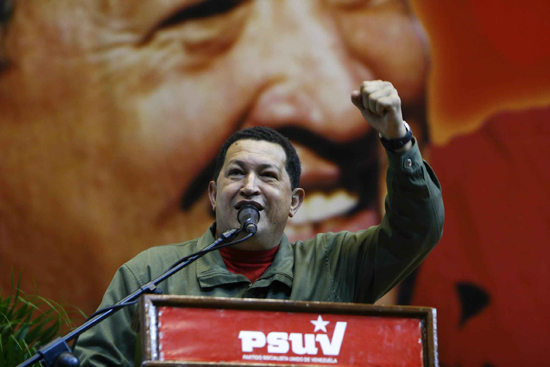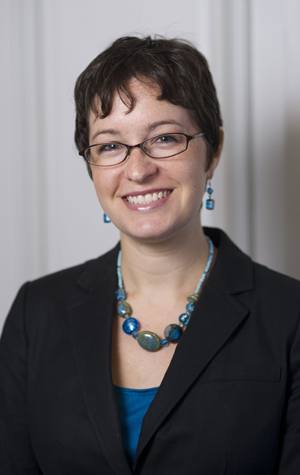With Hugo Chávez Dead, What Now?
CAS prof ponders Venezuela’s future

Venezuelan President Hugo Chávez, who died last week at 58, was a champion of the poor, who are filling the nation’s streets to mourn him. Photo by Bernardo Londoy
When he died last Tuesday of cancer at age 58, Venezuelan President Hugo Chávez left a bitterly divided nation with an uncertain future. During his 14-year rule, the feisty, colorful friend to Cuba was a perpetual thorn in the side of the United States, mocking its leadership and courting its enemies even as Venezuela became America’s fourth-largest oil supplier. Surviving several close elections and an attempted coup, Chávez used his nation’s wealth to lavish money on social programs for the poor. On Friday, throngs of his constituents gathered to weep in the streets and world leaders arrived for his state funeral, after which Vice President Nicolás Maduro was sworn in as acting president.
The nation’s future now hinges in large part on the interpretation of a constitutional mandate for a democratic election of Chávez’s successor, and whether Maduro will be permitted to run.
BU Today asked Renata Keller, a College of Arts & Sciences professor of international relations and an expert on Latin American history and relations with the United States, to comment on Chávez’s legacy and speculate on the future of his oil-rich, yet economically divided and increasingly unstable nation.
BU Today: What is the immediate impact of Chávez’s death on the Venezuelan people?

Keller: Chávez’s death has thrown his nation into a period of immense uncertainty. After the official announcement came, Venezuela’s foreign minister stated in a televised interview that Vice President Nicolás Maduro will assume the presidency and be in charge until a new election is held. However, the government has yet to provide many specifics about scheduling the new elections, and clashing interpretations of the constitution could derail efforts to conduct a seamless transfer of power from Chávez to Maduro.
The New York Times described Venezuela as bitterly divided. What are the nation’s divisions?
Chávez did not create the divisions in Venezuelan society, but he did exacerbate them. He was incredibly popular among the poor population that he championed. During his 14 years in power, the levels of poverty and unemployment in the country saw a steady and impressive decline. Chávez redirected much of his nation’s budget to social spending in crucial areas such as health, housing, and education. Thousands of people attended his funeral procession on Wednesday morning, mourning the loss of a leader who fought against the long tradition of inequality in Venezuela and across Latin America.
At the same time, Chávez also acquired numerous opponents at home and abroad. His critics have denounced his authoritarian methods and inflammatory rhetoric. They point to the significant increase in violent crime and homicides under Chávez’s watch, his uneven economic record, inflation, and shortages, and his ties to undemocratic leaders in Libya, Syria, and Iran.
Is Acting President Maduro the likely successor to Chávez? What kind of leader would he be?
While I would hesitate to assume that Maduro’s succession is a sure thing, I think it is likely, especially if he manages to capitalize on the outpouring of grief for Chávez. Up until recently, most observers described Maduro as a more pragmatic, reserved leader who favored negotiation over confrontation. However, he seems to be adopting some of Chávez’s style and tactics of late, and I suspect that he will continue to do so at least until his own power is consolidated.
What is Chávez’s chief legacy, in his own nation and beyond?
I think his chief legacy within Venezuela is his empowerment of the nation’s poorest citizens. Beyond that, Chávez was in the vanguard of the “Pink Tide” of leftist Latin American leaders that has swept the hemisphere in the last two decades. Many leftist leaders, from Lula in Brazil to the Castros in Cuba, owe Chávez a great deal, both economically and politically.
There seems to be a lot of confusion about the constitutional procedure for an election; is one likely to take place within the required month?
The constitution requires that an election be organized, though not necessarily held, within 30 days. I expect that Maduro will want to hold the election as soon as possible in order to capitalize upon the sympathy factor.
With the gap between rich and poor growing, and unrest brewing in the weeks leading up to Chávez’s death, is it possible the country will descend into violence?
Well, one could argue that the skyrocketing homicide rate over the past few years suggests that Venezuela has already, as you put it, descended into violence. As to the likelihood of outright civil war or the declaration of a state of emergency, I would not rule them out, but I think they are unlikely. I suspect that as long as the government observes plausibly constitutional procedures, the opposition will refrain from staging an armed rebellion.
Aside from Cuba, who were Chávez’s allies in Latin America? Is the interim government likely to face pressure from neighboring democracies and the United States to shift to the center?
Aside from the Castros, Chávez’s allies in Latin America included Evo Morales in Bolivia, Rafael Correa in Ecuador, Daniel Ortega in Nicaragua, (Luis Inacio) Lula (da Silva) in Brazil, and the Kirchners in Argentina. While it is very likely that the United States and other countries will try to pressure, or encourage, the interim government to shift to the center, I doubt that any efforts along those lines will succeed, at least in the short term. The memory of Chávez is still too strong.
In what ways, if any, did Venezuela become more democratic under Chavez?
New York University historian Greg Grandin makes a compelling argument in his piece for The Nation that Venezuela has become significantly more democratic under 14 years of Chávez. Grandin points out that Chávez submitted himself and his agenda to 14 national votes in elections that former U.S. president Jimmy Carter praised as “the best in the world.” Furthermore, popular participation in politics increased dramatically under Chávez through grassroots organizations, social movements, and other forms of activism.
Comments & Discussion
Boston University moderates comments to facilitate an informed, substantive, civil conversation. Abusive, profane, self-promotional, misleading, incoherent or off-topic comments will be rejected. Moderators are staffed during regular business hours (EST) and can only accept comments written in English. Statistics or facts must include a citation or a link to the citation.